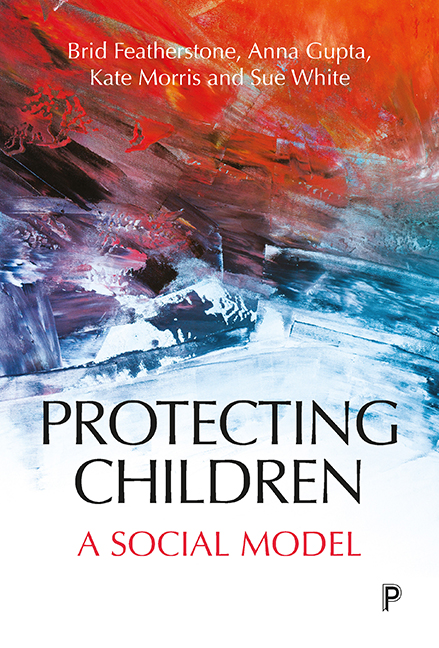Book contents
- Frontmatter
- Contents
- Acknowledgements
- one Introduction
- two Trouble ahead? Contending discourses in child protection
- three Building better people: policy aspirations and family life
- four Family experiences of care and protection services: the good, the bad and the hopeful
- five A social model for protecting children: changing our thinking?
- six A social model: experiences in practice
- seven Domestic abuse: a case study
- eight Crafting different stories: changing minds and hearts
- nine Concluding thoughts
- References
- Index
five - A social model for protecting children: changing our thinking?
Published online by Cambridge University Press: 12 April 2022
- Frontmatter
- Contents
- Acknowledgements
- one Introduction
- two Trouble ahead? Contending discourses in child protection
- three Building better people: policy aspirations and family life
- four Family experiences of care and protection services: the good, the bad and the hopeful
- five A social model for protecting children: changing our thinking?
- six A social model: experiences in practice
- seven Domestic abuse: a case study
- eight Crafting different stories: changing minds and hearts
- nine Concluding thoughts
- References
- Index
Summary
There can be no question that family case workers are in an exceptional position to make valuable observations on family life at first hand where they are protected, as they should be, from too large a case-load, and where they have had the kind of theoretical training in social science and practical training in social work which supplies them with the necessary background. ‘The interplay,’ says Professor Park, ‘of the attractions, tensions, and accommodations of personalities in the intimate bonds of family life have up to the present found no concrete description or adequate analysis in sociological inquiry.’ (Richmond, 1922: 227–8)
There is an irony in our resurrection of the social in social work. Mary Richmond, an early 20th-century social work pioneer, had in mind that social workers could make important contributions to social science. It is noteworthy that she quotes the sociologist Robert Park to argue that social workers might fill a gap which sociology had left open. Indeed, Richmond is widely seen as making a major contribution to the Chicago School of Sociology, with its emphasis on the ethnographic study of everyday lives. We would like to suggest that much may be gained by resuscitating the social dimensions of child protection practice, in order to nurture humane practice, through thorough understandings of the lives in the living, and also to inform with social science the ‘evidence base’ for policy and system design.
As we have noted previously, other areas of practice (than child protection) have much more clearly, in recent decades, highlighted the importance of the social and have been helpful to our thinking. In particular the ‘social model’ has challenged thinking across a range of fields, including disability and mental health. It has provided a philosophy and framework for articulating practices that challenge dominant biomedical models and their narrow focus on individual impairments, disease and risk. It has drawn attention to the economic, environmental and cultural barriers faced by people with differing levels of (dis)ability and built on a movement where those needing services were instrumental in articulating their rights to full participation in service design.
In this chapter we discuss the evolution of the social model in areas such as disability and mental health. In these domains, there has been a very clear ‘other’ to which the social model was responding – medicine and the notion of biological damage.
- Type
- Chapter
- Information
- Protecting ChildrenA Social Model, pp. 83 - 106Publisher: Bristol University PressPrint publication year: 2018



